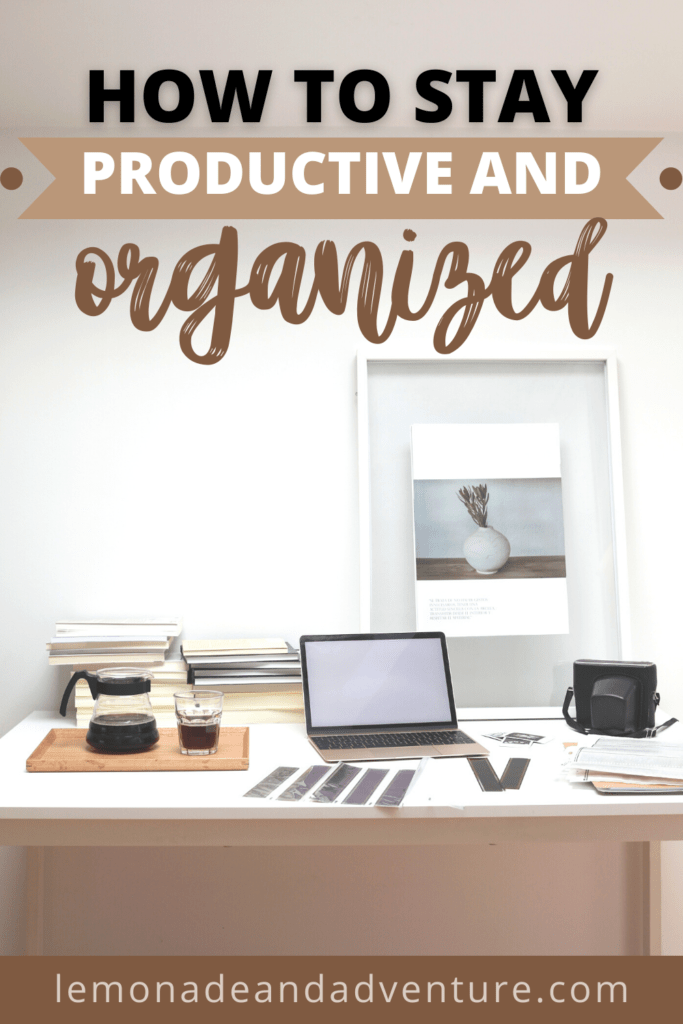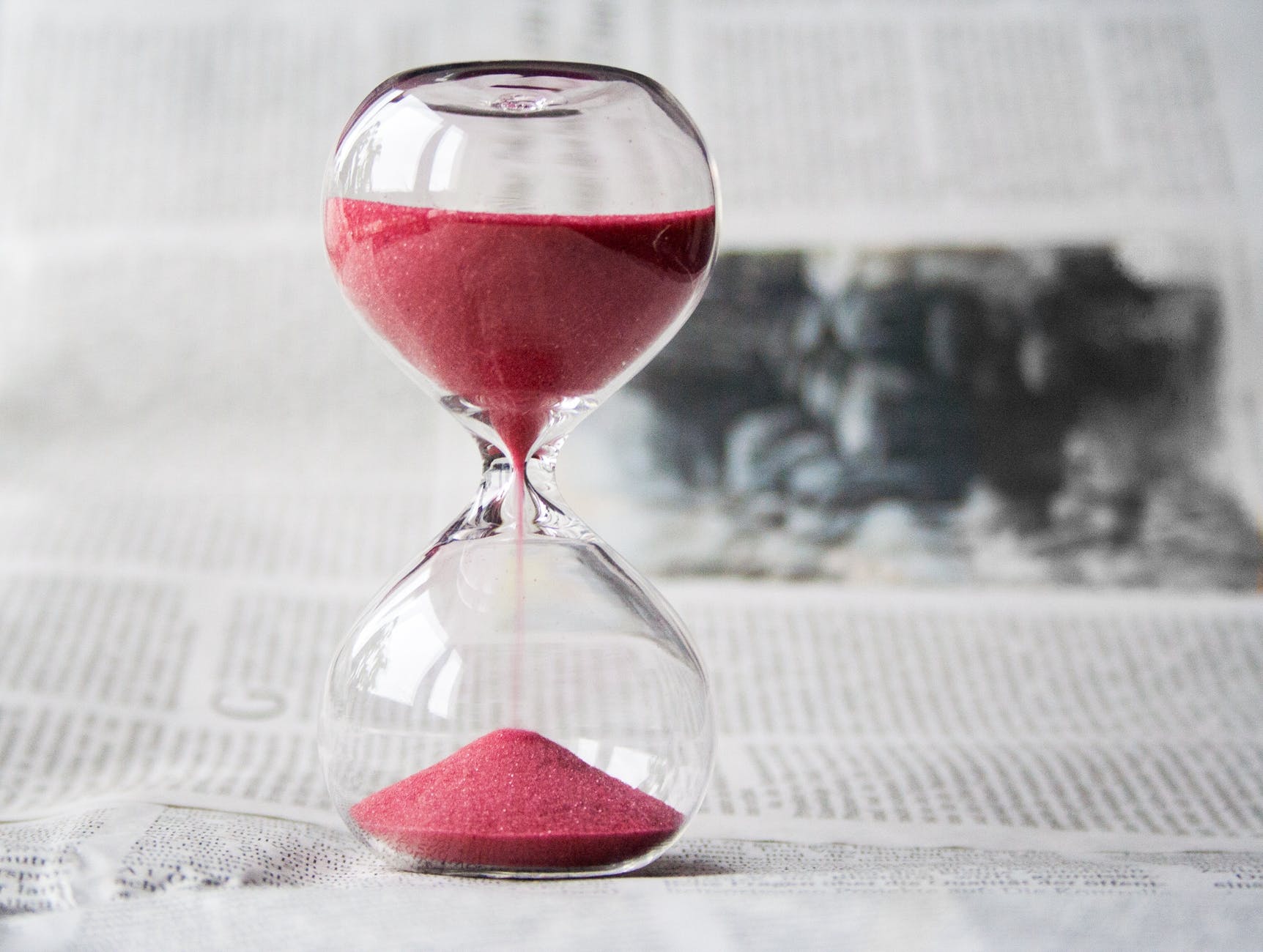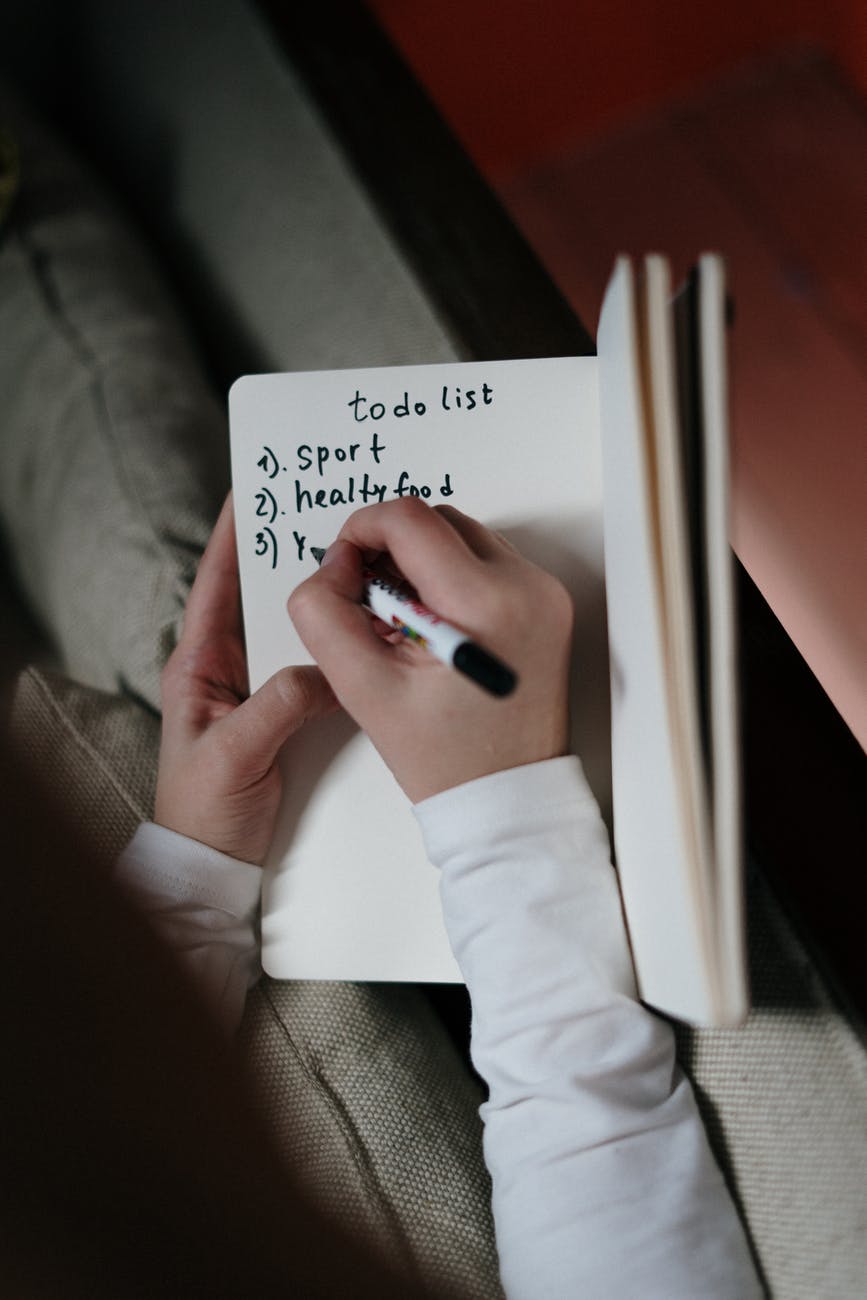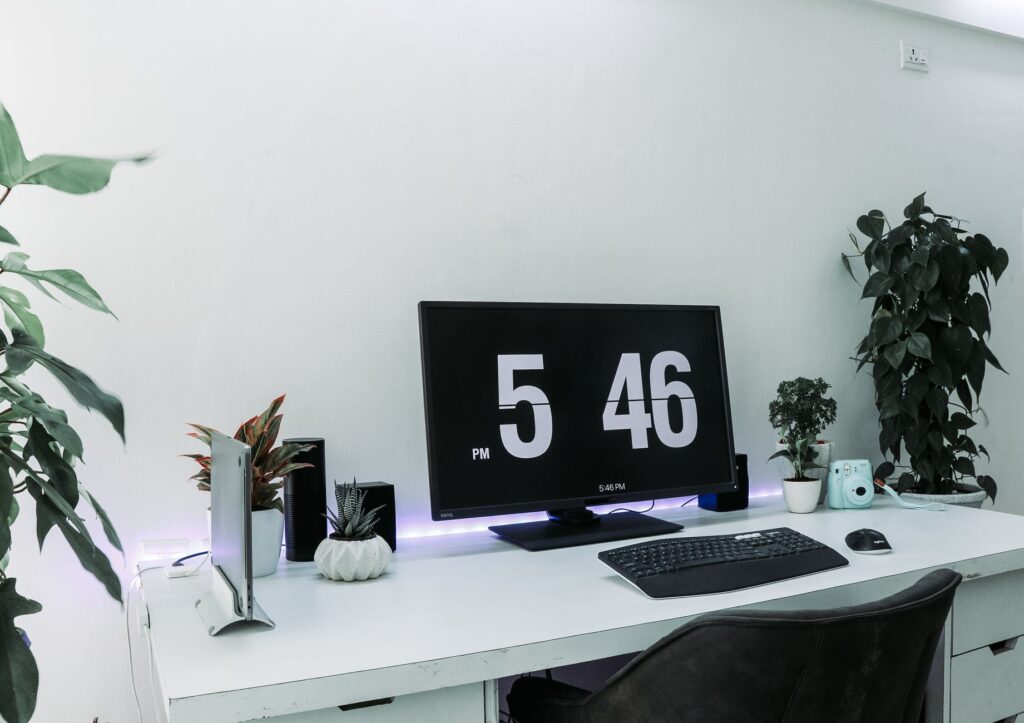It’s hard to stay organized when you feel overwhelmed. I’ve been there, too. Sometimes it’s hard not to sweat the small stuff. So, I put together some practical ways to keep a level head while trying to do your best to stay organized and productive.
I’m a sucker for feeling overwhelmed.
It feels like a punch to the gut when you’re so high on energy and excited to start work, and then you see one too many things in front of you and your heart starts to race faster every second. The stress of having too much on your plate can be crippling.
However, there are a few tips and tricks that can help you stay level-headed and get whatever job you need to be done.
So, personally, aside from running this blog, I also manage:
My home.
A YouTube channel (that I don’t pay too much attention to since I’ve started this blog and for good reason).
I’m also taking courses to help make this blog better.
I am an involved aunt of a super cool six-year old boy.
I’m also in a relationship, and we’re starting to shop for a house, and this pandemic has been going on for what seems like years…
With everything else, and especially since starting this blog, I’ve found that I get overwhelmed easily. There’s a lot to learn about blogging – a lot.
From SEO, to understanding Pinterest, to constantly asking who my audience is… who are you? All of these projects can be exhausting, and anytime you feel exhausted, it becomes so easy to become anxious and frustrated.

For me, I’ve learned to take things slowly and to get used to new things in waves before I keep incorporating more. Does that sound a bit like you? Well, I’ve got a few helpful tips that should help you to stay organized when you feel overwhelmed.
P.S. That question about my audience? I would love to get to know you more, so please leave a comment below and tell me more about yourself and how you cope with feeling like your to-do list is spiraling out of control!
Disclaimer: This post may contain affiliate links where I might make a little change if you were to purchase at no extra cost to you.
If you’re feeling overwhelmed when trying to start working out, try this relevant article: 9 Secrets to Start Working Out Without Feeling Overwhelmed
Table of Adventures
1 // Take a Deep Breath
Just do it. Don’t like… read ‘take a deep breath,’ then think about taking a deep breath, and acknowledge it’s good advice, then move on without doing it.
Stop for a second.
Close your eyes.
Take a deep breath.
Okay, proceed.
2 // Clear Your Area
As best as you can, clear your area.
Clearing your area helps to clear your mind and with a clear mind you can try to get yourself back on track.
Decluttering can take as little as a few minutes to as long as a couple of hours. If you’re anything like me, you’re meticulous about where everything goes and your ten minute session can easily turn into an hour.
Don’t be like me.

Set a timer for five to ten minutes and do a quick declutter to get your space opened up. Grab any essentials you need to work productively and surround yourself with only those things.
For me, that’s my laptop, iPad, and my planner with my pencil case. If I feel like I need something in particular for a certain project, I quickly grab it and keep it pushing.
Don’t waste your time trying to have a picture-perfect workspace. You can do that once you’re done with whatever has gotten you frazzled in the first place.
3 // Plan Your Next Moments
I have a couple of things to help me plan what I need to do.
I’ve got a Happy Planner (weekly + monthly), a desktop Weekly Planner, and I recently bought a desktop glass dry-erase board to write down any ideas that pop into my mind.
Now, this is super essential (in my humble opinion), for keeping yourself on track.
Whether you’re overwhelmed now, or you simply get overwhelmed from time to time (or a lot of the time), keeping track of the things that you need to do is imperative to functioning at a normal pace.
Creating a schedule can help to keep your mind grounded. Seeing things in smaller chunks, rather than feeling like you need to do everything at once, helps.
Don’t fall into the trap of making a marathon list of projects, however. Even if your daily to-do list consists of maintenance chores and maybe only 2-3 things that move your goals forward, all you have to do is make it through the list and keep going.
If you get 2 productive things done per day for a week, that’s 14 steps closer to your goals. If you keep that up, you’ll be cruising in no time!

As a blogger, it’s imperative that I manage my time well. I have specific days when I write my posts, a day when I need to have it back from my wonderful editor, and days when I create the pins for my Pinterest boards.
Scheduling the posts and the pins, and doing all the meta tags and whatnot, that all takes time too! Is it a lot of work? Heck yeah. Is it rewarding? Even more so.
My point is – planning ahead can mitigate a lot of heartache and help you avoid trouble down the line.
It can also help you keep things in perspective. You’ll realize that you don’t need to build your entire business/finish your life’s work/whatever it is you’re working on this week, or even next week.
But by breaking it down into manageable chunks each day, you can build the momentum and confidence you need to succeed over the long run.
4 // Find Techniques That Work For You
There are many techniques out there that can help you to keep yourself cool, calm, and collected as you tackle your larger projects.
4A: Task Quadrant Method
If you are a busy bee, with far too many tasks on your plate, try the Task Quadrant Method (as I like to call it).
It’s easy to do, I’ll show you how:
Get yourself a blank sheet of paper and replicate the following picture. Effectively, you’re trying to break your monumental to-do list into manageable chunks.

The DO NOW column is for those things that can’t wait, or at least it can’t wait for long. Some of that stuff is critical, and some of it isn’t, and by recognizing what is critical and time-sensitive, and what is simply time-sensitive, you can immediately recognize what you have to focus most of your energy on.
A lot of important, critical stuff can wait however, such as a call with your top client, or a strategy session with a business partner, or even a romantic dinner with your partner. Those go into your DO LATER column.
Whatever you decide is critical in the Do Later column is critical, but these are things that you have the luxury of planning… so do that!
Set aside time for these things so that you can give them the attention they truly deserve. If some crisis comes up, you can always reschedule, but these are your most important appointments. So be proactive about getting them done!
When it comes to checking emails, replying to comments on social media, and other sorts of ‘busy work,’ all that stuff is great to do, but only if you have the time. This is the stuff that you do when you are free and have nothing more pressing to do; after all, if it was so important that it needed to get done, it wouldn’t be on this list!
That said, this is the type of stuff where, if you’re going to do it, you should do it fairly promptly; just keep in mind that you should never feel overwhelmed by anything in this category.
If you fall behind checking your emails, for example, just skim for anything important and let the rest go.
My examples here are admittedly kind of flawed because some emails are super important, so you have to promote them to a higher category, depending on if they’re also urgent.
Social media comments, on the other hand… I mean, you guys are my community, right? So I need to stay involved with you all! Replying to you guys is a huge part of getting L + A to where I want it to grow.
But… you also won’t be able to comment on the blog if I don’t actually have the time to post anything, so… you get what I’m saying?
Now, I’m not lucky enough to have an assistant (yet!), but when I say “delegate” (under the Do Now column) I mean that you “delegate” your free time to doing these tasks.
For example – every two hours, you check your email and social, just to see if anything pops up. If it does, you have 15 minutes to reply to as much as you can before you head back to working on something more critical.

Or maybe you make videos and you have to do some video editing to make the videos presentable.
Now, I’d call a certain amount of editing critical, since no one wants to see a 25 minute long, unedited clip of someone fumbling around with a camera and then nervously forgetting what they’re going to say, but… let’s say you’re past that.
You shot the video, you gave it a solid once over, and now you just want to play around with the transitions, maybe throw in some cool graphics. All that is great – just don’t let it get in the way of the most important stuff you have to do.
Get your schedule for the day set and, if you have an extra hour or two, go ahead and go for it, and remember that if something more important comes up, this is the thing you should bump first.
Lastly, you have the Vault. The vault is for all those ideas you have – the stuff you haven’t acted on yet.
It’s where you write down that awesome next project so you don’t forget it. The important thing here is that you’re allowing yourself to not think about it anymore!
You haven’t lost it; when your schedule frees up, you can come back to the vault and dust off some of these brilliant brainstorming ideas and put them to work.
But by giving yourself permission to put them away from now, you free up your brain to focus more on the things that you actually need to get done today, not the things you hope you get to do tomorrow.

4B: Create Lists
This is really simple to do.
You’re already thinking of all the things you have to do. Well, stop and take a few minutes to write down a list of the things you need to do today.
Your list is probably chock-full of things to do. Except from here, circle the three most important things you need to get done by the end of the day.
Focus on those, and put the rest in the back of your planner. If you get done with those three, you can look at the list again and pick three more.
Simple.
5 // Pomodoro + Extra Time
Things take time. It’s a fact of life. Another fact is that, after working diligently on something for hours at a time, your body is going to need rest. Heck, your brain will need rest!
One way to ensure that you’re getting enough time to decompress while you’re hacking away at that to-do list is to use the Pomodoro Technique. Time-management is soooo important that I felt like Pomodoro deserved its own header.
If you aren’t already familiar with the technique, it is pretty easy to understand. You set up a timer and work solely on one thing in the allotted time you’ve given yourself.
You can use your watch, your phone, or whatever time-keeping device or Pomodoro-specific app you want to keep track.
You work for 25 minutes, then you take a 5-minute break. You do that 4 times and suddenly 2 hours have passed and you’ve been productive for most of the time, but you also gave yourself four little breaks to go to the bathroom, refill your coffee, stretch your legs, etc.

The nice thing about Pomodoro is that it gives you enough time to get into the groove of a task, but also keeps you from getting burned out.
It’s also designed to make it easy to juggle tasks; are you working on editing that video from before and the timer goes off?
Maybe that’s an opportunity to ask yourself if you want to spend another 25 minutes adding funny sound effects to your video, or if you want to refocus on something else for the next block of time.
When I was taking Organic Chemistry, Physics 2, and Cell Biology all at the same time, Pomodoro was a life saver. The workload was absolutely insane, especially because I hate physics.
Like… I hate physics.
And when the semester started, my time management skills were not up to par, so I kept getting bogged down in one subject and then scrambling to catch up on the others.
So, I researched Pomodoro and immediately downloaded two apps. Flora and Focus Keeper. And they were both amazing.
It’s kind of silly to say, but Flora helped me stay on track by growing a plant for me in the background. If you are in the middle of a time block and you open your phone, your plant dies.
It warns you first, but if you ignore the warning… well, bye-bye oak tree. I’m not going to lie, the guilt of killing my digital plant-friends was enough to help keep me on track.
Even better, the app is free, although they have a subscription if you want a variety of plants. It’s cool, and if you have the extra money you should totally support them, but the fact that they offer the app with all its functions for free is super awesome.

I paid $1.99 for Focus Keeper on iOS because I wanted certain pro features that Flora lacks, such as keeping a log of my Pomodoro’ing. It was $2 pretty well spent, since I still use it regularly.
This is an actual Pomodoro app – Flora lets you customize the time segments, which is pretty useful if you want to experiment with different lengths of time.
Focus Keeper, on the other hand, does let you add an ‘extra’ long break, which is what I usually do. 25 minutes on, 5 minutes off, with a 25-minute break after roughly 2 hours. I’ve literally kept this up for more than 6 hours straight at times, cranking out work.
Sometimes it gets painful sitting around for long stretches of time, so I really like the longer breaks since you can get up, go outside, and really clear your head before jumping back in refreshed.
So give Pomodoro a shot if you haven’t already. It helps you work hard, while also giving you the time to relax, have that cup of tea, stretch, and do all those other great, self-loving things that we often put off because we’re stressing about projects we should already be working on.
6 // Focus On One Thing At A Time
Multitasking is a lie!
Conventional wisdom says that women are notoriously good at juggling multiple things at a time, but according to science, it’s not really because we multitask well. We’re simply good at using our time effectively to do one thing at a time repeatedly.
If I know I have to do laundry, wash dishes, and cook breakfast, all in an hour’s time, I have to use my time efficiently. I can’t literally do them all at once. Which is why multitasking is a farce.

In that example, I’ll start on laundry, get it going in the washer, move onto starting breakfast, then do some dishes as the skillet heats up, etc. And I’ll go back and forth between cooking and washing up until breakfast is made, at which point I’ll eat, go check the wash, take the dishes over to the sink, and wash another load.
I know I’m preaching to the choir for a lot of you, but while it feels hectic at times to think about all the things I’ve just gotten done, it really is pretty straightforward if you just keep going methodically.
These other tasks we struggle with follow the same principal. If you think about the 2349871234 things on your plate, then of course you’re going to feel overwrought. But if you pick a single thing and work on it, you can get it done.
Remember I mentioned coming up with a schedule?
How about an hourly schedule?
For example, I work on blog posts for about 2-3 hours and once that’s done I move on to another item on my blogging list. I don’t do them all at once.
I can’t. Trying to work like that makes my anxiety go haywire and I ain’t havin’ it.
So, I break things down into manageable chunks.
Using my blog as an example again, here’s how I would do that:
Breakdown –
- Writing Blog Post (4 hours)
- Create Pins (1 hour)
- Research trending tags & SEO on Pinterest (1 hour)
This might be my agenda for a single day. By giving myself a time limit, I keep myself to account.
If I run out of time, I take a break, then move onto the next thing. If the task is critical, I come back and finish it towards the end of the day – notice my schedule doesn’t take up all 8 hours of my workday.
Those last 2 hours are for making sure that blog post is finished, those pins are done, and, if and only if both of those things are finished, checking social media, doing more SEO research, and anything else that might be in my DELEGATE quadrant from earlier.
Another trick is to work efficiently; if one of your to-do list items involves going to the post office, while another involves going to the supermarket, why wouldn’t you do both things as part of the same trip?
You can apply that mentality to anything else that you’re working on.

Why do you think I do my Pinterest research on the same day that I’m creating pins? Because the pins I’m creating always relate back to the blog post that I just wrote.
If I started making pins for blog posts I made a month ago, it wouldn’t be nearly as efficient (although it’s smart to make fresh pins). I might have to go back and reread what I wrote to remember how I phrased something.
I might even get my wires crossed entirely and link to the wrong post. Maybe I’m sitting there swearing that I did ‘Who What When Where Why’ as the motif for my Valentine’s self-care post, when, in reality, it was for my ‘Still Struggling to Start Your Fitness Journey’ post.
By not mentally ‘jumping around’ I keep myself from confusing myself, and I cut down on the time spent mentally commuting from one project to another.
7 // Delegate Tasks/Ask for Help/Outsource
Knowing how to delegate is one of the most important skills a good manager has, and since we’re out here learning how to manage ourselves, you need to know how to ask for help.
If you’re running a business, consider whether having an employee or business partner take over some of your tasks could free you up to work on more important tasks.
Alternatively, if your ‘business’ is taking care of your house and raising your family, ask yourself if your kids should be learning certain tasks to help around the house.
Even if you’re only able to get them to pick up their own rooms or help fold the laundry, that’s one less thing that you have on your plate, and you’re teaching them valuable life skills.
In my case, I have my boyfriend edit my posts for me. He has a degree in Journalism and he’s always writing and proofreading pieces for work, and he’s able to do the editing faster than I would. He has a strength that I don’t, and if I had to write and edit all my posts, I would get backlogged.

If you have some disposable income, you can take that logic to the next level and hire a freelancer to take on one of your projects.
Sites like Fiverr and Upwork have amazing freelancers on them, and they can help you with all sorts of projects. In my case, I’d love to get some of the video editing I have to do off my plate and free myself up for more content creation.
While this isn’t the cheapest option, it is a great way to avoid getting stuck on projects that aren’t really up your alley.
Learning to delegate tasks will help you get some things off your plate so you can stay more organized! So don’t be afraid to ask for help if you don’t know where to turn or what to do next.
8 // Get Little Things Out of The Way First
Usually we’re told to tackle the big things, but when you’re overwhelmed, doing the absolute opposite can really help you build up the momentum you need to tackle your more challenging projects.
So, don’t do the biggest things first if you already feel over your head. Look at the smaller items on your list and knock off as many as you can.

Do you have to file your taxes and take out the trash? Maybe do the garbage super quickly so you don’t have to worry about it while you try to remember where your W-2 is. Plus you can get some blood pumping in those limp noodly arms and get some fresh air as well.
If I have any laundry at all to do, for example, the first thing I do every morning is throw a load in the wash. That way, when I sit down to tackle my real work in the morning, I’ve already gotten something done!
Try something small and see if that helps you get started and rolling in the morning. Plus, striking one thing off your to do list right at the start of the day will give you that little endorphin rush to conquer the rest of your list in style.
Conclusion to Staying Productive and Organized!
Hopefully, this has helped you out so the next time you’re feeling super overwhelmed with a plate full of everything, you can use one of these tips to power through it. Whether it be through the Quadrant Method or making simple lists, you can make it through the storm of exasperation.
If you have a tip or trick that helps you out when you’re feeling stressed the hell out, let me and the other readers know down in the comment section.

I’m taking several notes because holy crap I hate being an adult and I’m sick of being overwhelmed and I just wanna be whelmed
😂 Not “whelmed” – I love it. Take advantage of the Pomodoro technique, Paola, that can really help you if you’re feeling like you get nothing done. It has helped me on several occasions.
I love love the first line!!!As soon as I saw it I was like “Are you in my head!” I. A succker for feeling overwhelmedHahah Brilliant. That made a perfectionist like me feel like wow… you get me in that deep kinda way haha. And this post was super helpful because you’re so real. Life continues and life was happening even before the pandemic and you reminded us by listing you shopping for a home, in a relationship and a Super col auntie I bet!! Thank you for that. Can’t wait to read your other posts by How do you discipline yourself to follow the quadrant thing!! Oh and I love decluttering and this post
I am so HAPPY that this helped you!
Believe me, I wanted to stress that I understand what it means to be overwhelmed with 1000 things happening all around us. From our phones to social media our attention spans are so minute, I’m surprised that society can get anything done sometimes. But, hopefully, some of these tips can help you out.
I may be able to get a post out on disciplining yourself to use the quadrant method. That one can be a little tricky if you’re not used to it. Pomodoro Technique is a great starter if you’re trying to learn how to manage your time though! Thank you for your input!